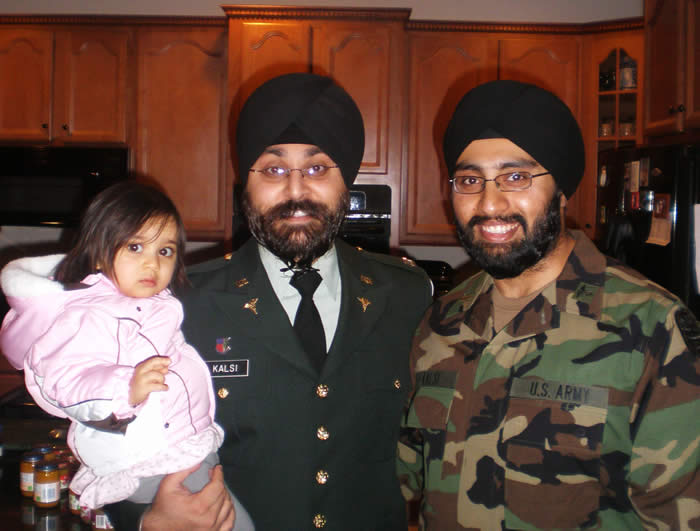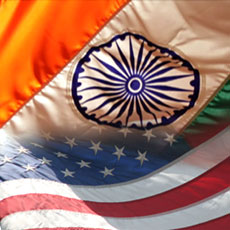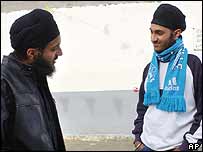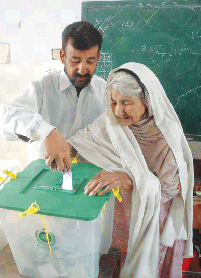
Guest blogged by Preeti Kaur
The following is an excerpt from Preeti Kaur’s poem “Letters Home,” in honor of those lost and injured in Oak Creek, WI. Read the full poem here, and sign the petition to push the FBI to track hate crimes against Sikhs.
i travel the 5th udaasi
i see no stranger in this country
when i was born my mother carried me
to richmond hill new york gurdwara to discover the first
letter of my name
as grown woman i perch above
pacific watch from el sobrante, california gurdwara
as fog rolls under golden
gate’s spine at sunset
i recite rehraas toward an angel island
100 year udaasi and i have traveled the whole country
hyphen is a language i lost
when the door to the Guru arrived
as asteroid from amritsar to stockton
Mian Mir put down the first brick
in the americas too
walt whitman spoke to 10 Nanaks
left his four directioned
pairs of shoes outside stockton’s darbar
shoes for us to borrow
in oak creek Bhai Taru Singh Ji’s scalp
lives again an eternal hair
which grows from 1907 bellingham
tied into the topknot of wisconsin
our kanga combs this hair with media soundbites
hair which absorbs perfume of flags
a mane we sometimes fear to wash
lakhi shah vanjara, mehar karo
give us your brave flame today
make our roof known as only nirbhao nirvair
hot winds blow away
with 5th Nanak’s naam we alight
this fire beneath us the first shaheed
a heat which ignites miri piri
for when they come for us
again
As many of us in the US and around the world have been celebrating the beginning of a new year this past week as well as  the Gurpurab of Guru Gobind Singh, a new draconian law has been brought upon us in the United States with near silence from the mainstream media. On New Year’s Eve, President Obama signed into law the National Defense Authorization Act, which includes provisions that allow the US military to round up and indefinitely detain people, including US citizens, without any charge or trial.
the Gurpurab of Guru Gobind Singh, a new draconian law has been brought upon us in the United States with near silence from the mainstream media. On New Year’s Eve, President Obama signed into law the National Defense Authorization Act, which includes provisions that allow the US military to round up and indefinitely detain people, including US citizens, without any charge or trial.
Obama himself originally threatened to veto the bill if the language of indefinite decision wasn’t taken out. Yet he proceeded to sign the bill into law as we move into 2012, perhaps giving him the legacy, as Human Rights Watch director Kenneth Roth states, ” as the president who legalized indefinite detention without trial or cause.”
The American Civil Liberties Union (ACLU) states:
We are extremely disappointed that President Obama signed this bill even though his administration is already claiming overly-broad detention authority in court. Any hope that the Obama administration would roll back those claims dimmed today. Thankfully we have three branches of government, and the final word on the scope of detention authority belongs to the Supreme Court, which has yet to rule on the scope of detention authority. But Congress and the president also have a role to play in cleaning up the mess they have created because no American citizen or anyone else should live in fear of this or any future president misusing the NDAA’s detention authority.
As the debate over the so-called “Ground Zero Mosque” wages on in the media with plenty of misinformation and a whole lot of fear-mongering, we finally get some worthwhile news from The Daily Show on the subject.
| The Parent Company Trap | |
Guest blogged by Brooklynwala
 There’s no shortage of reasons why progressives and people who believe in social justice should be gathering together in the US now more than ever. With US wars raging on in Afghanistan, Iraq, and Pakistan, the financial meltdown taking its toll working and poor Americans, and one of the most catastrophic ecological crises in the history of humanity currently destroying Gulf coast, we have a lot of work to do.
There’s no shortage of reasons why progressives and people who believe in social justice should be gathering together in the US now more than ever. With US wars raging on in Afghanistan, Iraq, and Pakistan, the financial meltdown taking its toll working and poor Americans, and one of the most catastrophic ecological crises in the history of humanity currently destroying Gulf coast, we have a lot of work to do.
This June 22-26th, thousands of grassroots activists from around the country will be convening in Detroit, MI for the second United States Social Forum. Building off the World Social Forum process that began in 2001 in Porto Alegre Brazil, the US Social Forum was created with the assumption that in order to change the world, we must change the United States (the belly of the beast, as may of us often refer to our home).
Here is a clip of poet/actor Jessica Care Moore plugging the gathering:

Healthcare reform, immigration reform, banking reform, and the list goes on. This past week a diverse coalition lead by Rep. Luis Gutierrez (D-Ill) are laying down the marker in 2009 for comprehensive immigration reform by introducing the Comprehensive Immigration Reform for America’s Security and Prosperity (CIR-ASAP) Act of 2009. This bill has not been passed yet; it has only been introduced.
In a country built on the hard work of immigrants, it is imperative that this group be protected in the United States. Recently, there was a report that 1/3 of Los Angeles’s economy is dependent on immigrants. Also, immigrants are known for their entrepreneurship in small businesses. Tuyet Le, Executive Director of the Asian American Institute, says: “Family-based immigration has long created the foundation for strong, entrepreneurial communities across the country. This bill will reunite immigrants with their loved ones and will also provide some increases in high-skill temporary worker visas.”
This legislation focuses on undocumented students, family reunification, and worker visas-issues affecting our Punjabi Sikh community in America. For example, CIR-ASAP would allow undocumented high school graduates who came to the United States before the age of 16 to attain legal residency. This residency would open up educational and financial aid opportunities. This portion of the bill is modeled after the DREAM Act of 2009, except that it shortens the six-year wait period to three years and removes fines.
Ravi Singh Bhalla was elected to the City Council in Hoboken, New Jersey this past week! A city that is less than 1% Asian and predominately white, Hobokens elected Bhalla with 5,810 votes. Bhalla had the highest number of votes amongst the 6 candidates competing for the 3 council seats.
In an e-mail out to supporters, Ravi’s brother, Amardeep Singh, described the bigotry they received during this campaign. He writes:
“… elections are not always for the faint of heart … we were cursed at constantly, literature was ripped out of our hands and stomped on, I was told by someone “I love killing Arabs”, and I was asked whether I “had a green card.”
Despite these attacks, the residents of Hoboken voted for Bhalla because he was a committed candidate who focused on the issues. Bhalla says, “It’s very humbling … it shows that people were focused on what a candidate brought to the table.”

Sikhs Now: Kamaldeep Kalsi (L) and Tejdeep Rattan (R)
Two Sikh recruits in the U.S. Army, Kamaljeet Singh and Tejdeep Singh, were told they would be allowed to continue to wear their turbans as active members of the military. They describe this as being able to wear both their uniforms: that of a Sikh, and of a member of our Armed Forces. Now Army personnel have back-pedaled, claiming a 1981 ban prohibits soldiers from wearing “overt” articles of faith — including the dastar.
Despite a long history of Sikh participation in armed forces worldwide, Steve Levine, a former Army lawyer from 1992-1999, speculates that there are at least two policy reasons for requiring shorn hair: unit cohesion, and the ability to wear military equipment [link]. This seems incongruous given that Sikhs had served on active duty in the Army with full daris and dastars, and were perfectly well-protected, in the past. In light of previous exemptions, lawyers for these Sikhs argue the policy is an undue burden on the free excercise of faith under the Religious Freedom Restoration Act of 1993.
 Not in India! In India, the state only engages in what is euphemistically called “fake encounters.” While many in the Sikh community remember the tragic events of 1984, in many ways the events did not just transform the Sikh nation, but has had a lasting effect on the Indian state.
Not in India! In India, the state only engages in what is euphemistically called “fake encounters.” While many in the Sikh community remember the tragic events of 1984, in many ways the events did not just transform the Sikh nation, but has had a lasting effect on the Indian state.
Rarely do I see this line of questioning amongst Indian academics, elite, or the media. Violence does not only affect the victim, but the perpetrator is also transformed. Last week, I commented on one such transformation in the Indian State – when a mainstream journalist can openly call for “state terror(ism)” as a tactic to perpetrate against its own citizenry.
This week, in a related story, but still somewhat different, I highlight the euphemism “fake encounter”. Although this term had traction before 1984 and was one of the spearheads against which Baba Jarnail Singh Bhindranwale fought against, it was in the post-1984 Punjab that supposed “encounter deaths” became so widespread and with a complacent Indian press parroting the State’s reports soon found them relegated to back pages. If there truly is a “Punjab lesson”, it was that other Indian State agencies could engage in these “fake encounters” with complete impunity. The latest case comes from the state of Chhatisgarh and the rural areas near Singaram.
 In 2006, Professors John Mearsheimer (University of Chicago) and Stephen Walt (Harvard) published a book titled The Israel Lobby and US Foreign Policy. In the book, Mearsheimer and Walt raise the following point – that since 1967, America’s relationship with Israel has been the centerpiece of its Middle East foreign policy.
In 2006, Professors John Mearsheimer (University of Chicago) and Stephen Walt (Harvard) published a book titled The Israel Lobby and US Foreign Policy. In the book, Mearsheimer and Walt raise the following point – that since 1967, America’s relationship with Israel has been the centerpiece of its Middle East foreign policy.
They then ask the question:
Why has the US been willing to set aside its own security and that of many of its allies in order to advance the interests of another state? One might assume that the bond between the two countries was based on shared strategic interests or compelling moral imperatives, but neither explanation can account for the remarkable level of material and diplomatic support that the US provides…. So if neither strategic nor moral arguments can account for America’s support for Israel, how are we to explain it?[link]
The answer:
The explanation is the unmatched power of the Israel Lobby. We use ‘the Lobby’ as shorthand for the loose coalition of individuals and organisations who actively work to steer US foreign policy in a pro-Israel direction. This is not meant to suggest that ‘the Lobby’ is a unified movement with a central leadership, or that individuals within it do not disagree on certain issues. Not all Jewish Americans are part of the Lobby, because Israel is not a salient issue for many of them. In a 2004 survey, for example, roughly 36 per cent of American Jews said they were either ‘not very’ or ‘not at all’ emotionally attached to Israel.[link]
While the Israeli Lobby remains one of the most powerful groups in Washington DC, there is a rising group in town – the India Lobby. Sometimes I am shocked by the naivety of Sikh-Americans that have NO understanding of the power of the Indian lobby. They are generally completely ignorant of the vast prestige and increasing power of this group. (Then of course, there is the other extreme that believe ‘agents’ lurk around every corner and never hesitate to call anyone that disagrees with them, a ‘sarkari agent.’)
Over the weekend it was reported that two Indian fighter jets violated Pakistani airspace. Although the Indian state is claiming the trespass was inadvertent, it seems that such a move is meant to engage in a ‘psychological escalation’ and pressure Pakistan into taking bolder actions against various militant groups.
However from talking to relatives in India and keeping abreast of the situation through Indian and Pakistani newspapers, it seems that an Indian strike against Pakistan is becoming a foregone conclusion. Anytime India and Pakistan have come to blows, it is the Punjab that is on the frontline. Thus while all South Asians should be aware of the ongoing situation, Sikhs in particular should be paying stark attention. Stratfor has provided an interesting analysis of the situation, which I try to summarize some of the points here.
While exploring the Sikh blogistan, I came across this link from Sikhswim (Thanks Savraj!) and wanted to share it with the rest of the Langar-ites.
Late last year, November 2007, a Sikh Seattle taxi-driver, Sukhvir Singh was brutally attacked by a drunken Luis Vazquez. Luis had been placed in Sukhvir’s taxi by two police officers, after he had been denied entry into Husky Stadium for public drunkenness and alcohol-induced bellicose behavior.
The story may have ended with the sentencing of Luis Vazquez, but it doesn’t. The story is also about the Sukhvir’s courage, faith, and forgiveness. Sukhvir was the vehicle for Waheguru’s forgiveness. Luis has been given another opportunity. The video is a bit extended, but well worth the watch.
Reflection for Monday by Guru Nanak from SGGS (p. 223) in Raag Gauri:
Khima Gahi Brath Seel Santokh
Extending forgiveness is the (true) fast, (the true act of) kindness, (the true path of) contentment
The New York Sun posted an editorial today that raises the question of ‘neutrality and justice.’ Quoting from Federal Judge John Noonan in the famous case of Harpal Cheema, who was jailed for six years on suspicion of fundraising for the Khalistan Commando Force:
“Contrary to the government’s assertion, it is by no means self-evident that a person engaged in extra-territorial or resistance activities — even militant activities — is necessarily a threat to the security of the United States. One country’s terrorist can often be another country’s freedom-fighter.”
The New York Sun editorial calls for giving amnesty to two freedom fighters that fought/are fighting against communist regimes. General Vang Pao, is a hero to most Hmong-Americans, and maybe even known to our readers in Sacramento, Fresno, and other locales with high Hmong concentrations. General Pao is facing weapon charges for attempting to aid Hmong militants against the Laotian regime. The other, Cambodian-American Yasith Chhun, attempted something similar against the Cambodian government.
As the summer Olympics game approaches and we are repeatedly reading of continued Tibetan freedom protesters against the Chinese government. What should be the role of Tibetans in America? Should America (or fill in whatever country you are from) provide a space for dissenters to come together? For Irish-Americans, Jewish-Americans, South African-Americans, the American soil has always allowed this ground. Some chose organizations that were not violent, but many did not. What should be the limitations? Is it violence? However, even here it becomes murkier. In Harpal’s case, he didn’t engage in any violence, but he did fundraise for certain groups. What is our barometer of justice? Should the American judicial system be wed to the existing nation-state set-up in the world? Or is the metric the relationship between the opposed state and the United States?
 Just like Hurricane Katrina is no longer the hot topic at the dinner table for Americans it seems that the French Sikhs have been forgotten for the Sikhs. I will state the obvious that there are formal organizations that are supporting these Sikhs in their fight for the right to wear their turbans; however is the “issue” getting the widespread spotlight it did for a brief moment when the ban was first put in place? There is sympathy on a global perspective of the rights of the French Sikhs being violated; however I am more concerned with the affects on their day to day lives. How many Sikh boys are still not in school – or is this even the case? What about those that can’t get driver’s licenses or ID’s. Are there children that have been out of school for an extended period of time – are they now working? What about their futures? I can only speak for myself and those around me – our conversations, and concern is for the most part only around issues that have a direct impact on our lives. The latest TSA regulations are always of concern and something to gripe about – but how much do they really infringe on our lives? Are our futures limited by TSA regulations? Dare I say we are a selfish bunch that can’t look beyond our own backyards?
Just like Hurricane Katrina is no longer the hot topic at the dinner table for Americans it seems that the French Sikhs have been forgotten for the Sikhs. I will state the obvious that there are formal organizations that are supporting these Sikhs in their fight for the right to wear their turbans; however is the “issue” getting the widespread spotlight it did for a brief moment when the ban was first put in place? There is sympathy on a global perspective of the rights of the French Sikhs being violated; however I am more concerned with the affects on their day to day lives. How many Sikh boys are still not in school – or is this even the case? What about those that can’t get driver’s licenses or ID’s. Are there children that have been out of school for an extended period of time – are they now working? What about their futures? I can only speak for myself and those around me – our conversations, and concern is for the most part only around issues that have a direct impact on our lives. The latest TSA regulations are always of concern and something to gripe about – but how much do they really infringe on our lives? Are our futures limited by TSA regulations? Dare I say we are a selfish bunch that can’t look beyond our own backyards?
The pundits (is that really an appropriate word here?) were right, the Musharraf coalition suffered a crushing defeat. The party of the slain Benazir Bhutto, the PPP, gathered 31%of the national assembly seats(83/272), Nawaz Sharif’s PML-N gained 25% (69/272), and the Musharraf-backed PML-Q collected 16% (43/272).
What we know from the votes?
- The PPP, although the largest party at the center, will need a coalition partner. Whether it goes with the pro-Musharraf PML-Q or anti-Musharraf PML-N will have huge ramifications on the immediate future of the country. The PML-N has vowed to work towards Musharraf’s impeachment. The PPP has made no such indication at present. However, even if the two rivals – the PPP and PML-N – form a coalition, they will not have enough votes to impeach Musharraf.
- At the state-level, the election shows the divided Pakistani populace. The PPP won a majority in the Sindh Assembly. Sindh has traditionally been the PPP’s base region. In the most populous state, Punjab, Nawaz Sharif’s PML-N is the largest party with more than 1/3 of the total assembly seats (101/297). Nawaz Sharif comes from a huge steel magnate family based out of Lahore.
- The PPP is the only national party in Pakistan.
- Musharraf is the biggest loser of the election in that his popularity was largely eroded due to his dealings with the Chief Justice and the lawyer protests, his invasion of the Lal Masjid, and his widely being blamed for the assassination of Benazir Bhutto.
- The religious coalition in the important NWFP, the MMA, unraveled and led to a victory by the ANP, a secular Pashtun nationalist party. It seems the attempt to impose harsh interpretations of shariat law led to the defeat of the incumbent MMA.
According to the World Health Organization at the end of 2005 there were 5.7 million adults and children living with HIV/AIDS in India with a population of approximately 1.1 billion. India is the second largest country behind South Africa with the highest number of HIV/AIDS patients.  In India, Mumbai is generally viewed as the Indian city with the most HIV/AIDS patients. However, the state of Punjab is not immune to the epidemic, even though the numbers are relatively small compared to major urban centers such as Mumbai. Numbers aside, the primary source of transmission of the HIV/AIDS within and outside of Punjab is heterosexual intercourse and intravenous drug use. Prof. Sehgal S. of the Department of Immunopathology, Postgraduate Institute of Medical Education and Research, Chandigarh states, that 80.5% of HIV/AIDS patients contracted the virus heterosexually in Punjab, while India’s National AIDS Control Organization (NACO) believes that “the bulk of HIV infections in India occur during unprotected heterosexual intercourse”. Furthermore, the International Women’s Health Coalition cites that one of the highest risk factors for women contracting HIV/AIDS is marriage with 4/5 of new infections in women resulting from having a sexual relationship with their husband. Hence, women, particularly, those in rural areas are one of the fastest growing populations of HIV/AIDS patients in India as well as other countries. A CBS News report states that for Dr. Solomon, 90% of “female patients [at his AIDS hospital in Madras] are not prostitutes, but monogamous women who’ve contracted HIV from their husbands”. Many of these women are like Periasamy Kousalya “… whose husband from an arranged marriage was a trucker. He had HIV before they got married”.
In India, Mumbai is generally viewed as the Indian city with the most HIV/AIDS patients. However, the state of Punjab is not immune to the epidemic, even though the numbers are relatively small compared to major urban centers such as Mumbai. Numbers aside, the primary source of transmission of the HIV/AIDS within and outside of Punjab is heterosexual intercourse and intravenous drug use. Prof. Sehgal S. of the Department of Immunopathology, Postgraduate Institute of Medical Education and Research, Chandigarh states, that 80.5% of HIV/AIDS patients contracted the virus heterosexually in Punjab, while India’s National AIDS Control Organization (NACO) believes that “the bulk of HIV infections in India occur during unprotected heterosexual intercourse”. Furthermore, the International Women’s Health Coalition cites that one of the highest risk factors for women contracting HIV/AIDS is marriage with 4/5 of new infections in women resulting from having a sexual relationship with their husband. Hence, women, particularly, those in rural areas are one of the fastest growing populations of HIV/AIDS patients in India as well as other countries. A CBS News report states that for Dr. Solomon, 90% of “female patients [at his AIDS hospital in Madras] are not prostitutes, but monogamous women who’ve contracted HIV from their husbands”. Many of these women are like Periasamy Kousalya “… whose husband from an arranged marriage was a trucker. He had HIV before they got married”.
